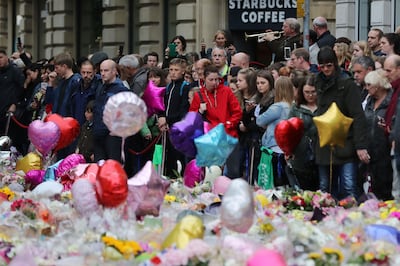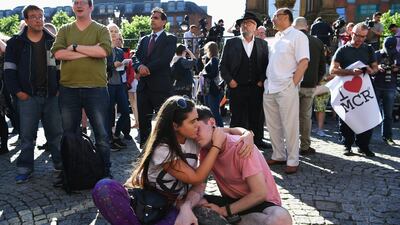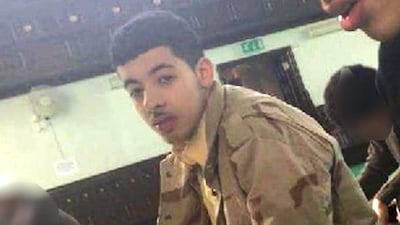Many young survivors of the Manchester Arena bombing were “let down by adults in authority” as they dealt with mental trauma in the aftermath, a study has found six years after the attack.
Britain's Prince William hailed the youngsters as "an inspiration" as they opened up on what he called "significant personal challenges".
Survivors said their feelings were dismissed as “teenage hormones”, their ordeal described as a “positive experience” and that in many cases they were not offered help at all.
The findings were described as heartbreaking by the head of a British emergencies charity.
The May 22, 2017 terrorist attack killed 22 people and injured hundreds at an Ariana Grande concert attended by many teenagers and young people.
A device was detonated at the arena by ISIS-inspired suicide bomber Salman Abedi, who planned the atrocity with his brother Hashem.
In the aftermath, young survivors who turned to teachers, doctors or counsellors for help were often left feeling worse, according to the new study by the National Emergencies Trust and Lancaster University.
Advice from adults included that “this hardship would make me a stronger person” and that no help was available unless patients seemed suicidal or physically unwell.
“The nine young and incredible minds behind this project, and the many more who have contributed, are an inspiration – turning significant personal challenges into positive change," said Prince William, a patron of the charity.
"This report makes clear that young people who have experienced the trauma of terrorism have needs unique to their age. These are minds that need the space to have their voices heard and feelings acknowledged.
"We must listen to their stories now, in order to learn for the future. I look forward to seeing the change that it creates.”
Accounts from survivors also included:
· School pupils being told they should “crack on” or “needed to get over it” within days or weeks of the attack
· Young people’s emotions being put down to “teenage hormones” or adolescents “wanting attention”
· A doctor offering no support besides telling a survivor they were “more likely to be hit by a bus than it happen again”
· People with mental trauma feeling “neglected” or “forgotten about” compared to those with physical injuries
About 40 per cent of young survivors said they were never offered professional support, according to the report.
The survey of 200 people who experienced the Manchester attack was drawn up by nine young survivors themselves.
The findings were “heartbreaking and unsurprising all at the same time,” Mhairi Sharp, the chief executive of the National Emergencies Trust, told a counter-terrorism event in London.
She said it was the first time young survivors had been asked about their mental health support.
As a country “we can respond to physical injury, we can respond to hardship. But when it comes to bereavement and mental health, we’re not prepared,” Ms Sharp said.
“If something happens tomorrow, we won’t be prepared again.”
Manchester Arena bombing – in pictures
The 46-page report called Bee the Difference, a nod to the worker bee symbol of Manchester that became an emblem of solidarity after the attack, said some young people received valuable support from adults.
But “too many testimonials show that adults in positions of authority tried to downplay their feelings and experiences,” it said.
“While it’s possible that some of this behaviour was well-intentioned, it was detrimental to survivors’ mental health, and even dissuaded some from seeking further help.”
One young survivor, Ellie Taylor, was quoted as saying: “We never knew how challenging it would be trying to not only find the support but find help that wasn’t more damaging and triggering.
“This project has given me hope that young survivors will never feel ignored, invalidated, and disregarded ever again.”

Figen Murray, the mother of attack victim Martyn Hett, last week called for life-saving training to become part of workplace inductions in Britain in order to increase preparedness among adults.
An official inquiry was critical of the immediate emergency response to the attack, in which chairman Sir John Saunders said “many things went badly wrong”.
The inquiry found that one victim, John Atkinson, could have survived his injuries “had he received the treatment and care he should have”.
It was the deadliest of a spate of Islamist attacks in 2017 that saw pedestrians run down near the Palace of Westminster and stabbed to death near London Bridge.
The same year, far-right terrorist Darren Osborne drove a van at Muslim worshippers near the Finsbury Park mosque, killing one and seriously injuring others.













